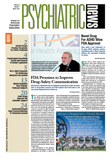Recent additions to the list of Medicaid beneficiaries exempted from the proof-of-citizenship requirements implemented in 2006 include a group that had drawn special interest from APA.
Congress enacted legislation late in 2006 exempting Medicaid applicants and recipients from providing such documents if they are children in foster care, adopted children, or Supplemental Security Income (SSI) recipients.
APA had voiced concerns about the impact of the identification rule on people with disabilities, including children in foster care, who have a high incidence of mental health problems.
“We've been very concerned that the proof-of-citizenship requirements for Medicaid beneficiaries could seriously impact their ability to get the mental health care they need,” said Lizbet Boroughs, deputy director of APA's Department of Government Relat ions. She noted that documentation requirements are especially burdensome to people who have impaired cognitive function due to mental illness.
The exemptions were highlighted in a February letter from the Centers for Medicare and Medicaid Services (CMS) to the National Association of State Medicaid Directors (NASMD), which made it public.
The Kaiser Family Foundation estimates that about 800,000 foster children will be affected by the Medicaid rule change, but it has not estimated how many SSI recipients would be affected.
Federal Medicaid of ficials also announced an administrative change in March that would make it easier for U.S.-born babies of noncitizens to gain access to Medicaid services. The Bush administration's rules for the 2006 Medicaid proof-of-citizenship legislation explicitly barred Medicaid eligibility for babies of illegal immigrants, whose births were covered under an emergency Medicaid provision.
The new rule allowing babies of illegal immigrants to receive Medicaid benefits requires that a parent provide documentation to prove the citizenship of his or her children by one year after birth to maintain the children's Medicaid coverage. The new rule will not affect Medicaid proof-of-cit izenship requirements for adults or children older than age 1.
The citizenship-identification requirement stemmed from the Deficit Reduction Act of 2005, which became law on February 8, 2006, and required states to verify the identity of all Medicaid patients and applicants who must prove citizenship to obtain services. The new restrictions became effective July 1 and are intended to prevent undocumented immigrants from falsely claiming to be citizens and receiving benefits (Psychiatric News, September 15, 2006).
Documents that can be used to prove citizenship include a U.S. passport, certificate of U.S. naturalization, or certificate of U.S. citizenship. Other documents—such as the original version of a U.S. birth certificate or official military record of service showing a U.S. place of birth—are acceptable when accompanied by proof of identity.
Thirty national and state child welfare, health care, and labor organizations advocated for exempting foster and adoptive children from the requirements.
“We were glad to have an opportunity—for clear reasons—to exempt these people from the [citizenship] rule because it was affecting a lot of people who were not illegal,” said Martha Roherty, director of NASMD, in an interview with Psychiatric News.
APA has urged Congress to revert to the approach that allowed each state to decide whether to require proof of U.S. citizenship. In the past, most states allowed beneficiaries to attest to U.S. citizenship under penalty of perjury. Documentation was required only from those whose citizenship status raised doubts among state Medicaid officials.
A February report from the Center on Budget and Policy Priorities that examined the requirement's impact in six states found early data that indicated a “significant” drop in enrollment since the identification requirement was implemented, which Medicaid officials in those states attributed primarily to the identification requirement. The states reported that they denied or terminated Medicaid benefits because some beneficiaries or applicants could not produce the required documents, despite appearing to be U.S. citizens (Psychiatric News, March 16).
Several bills have been introduced in Congress to expand the proof-of-citizenship exemptions further. Among them is a bill (HR 210) that would waive the requirement for children under age 1 who are born in the United States to a Medicaid-eligible mother.
The CMS letter is posted at<www.nasmd.org/SMD_letters/docs/SMD-Letter-on-Citizenship-Requirements-2-22-2007.pdf>.▪
